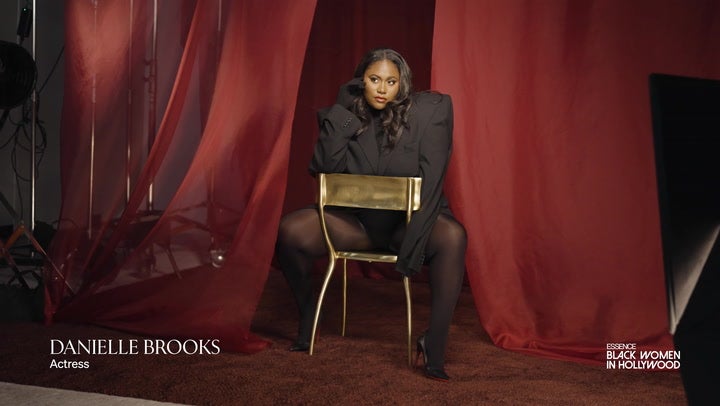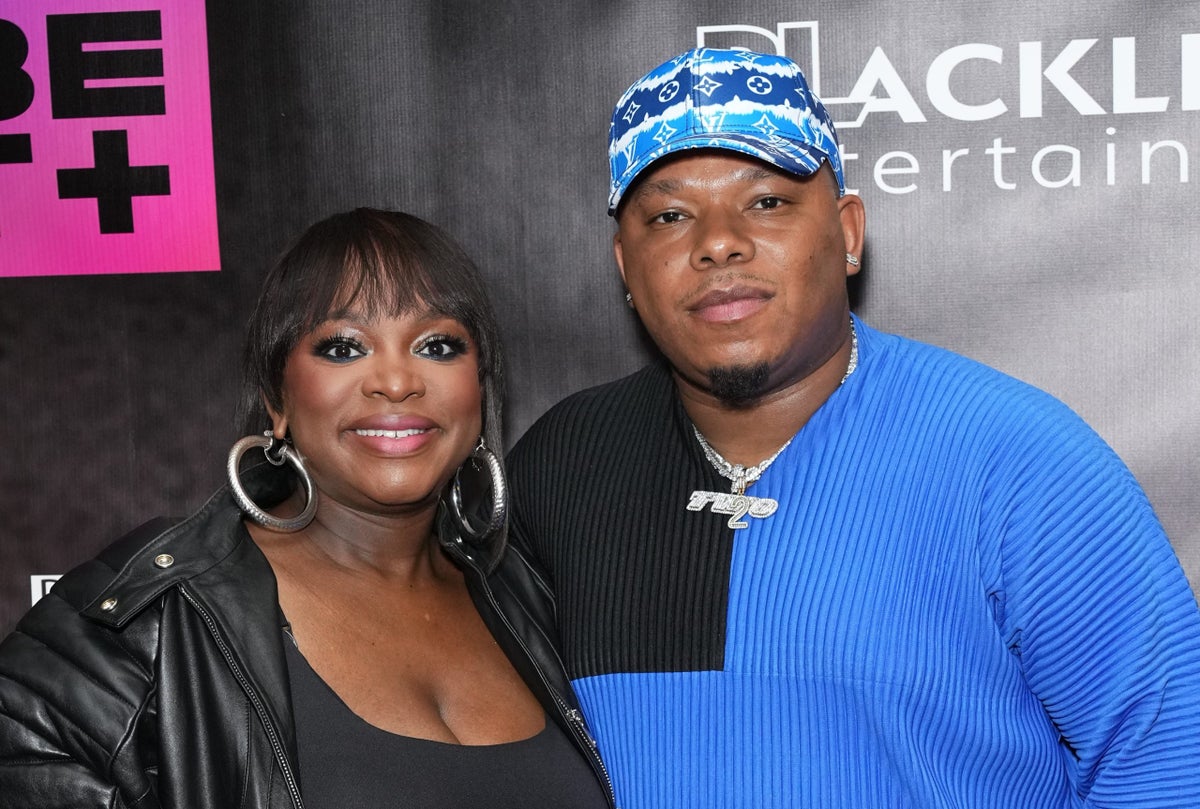


Sports journalists Joy Taylor and Taylor Rooks are two of the most notable figures in entertainment. Rooks is the Feature Reporter on Amazon’s Thursday Night Football broadcast, as well as the host of Taylor Rooks X on MAX. Taylor, the host of FS1’s Speak, delivers poignant and insightful takes on a daily basis. Individually, their voices have become paramount not only in the media space, but also in the realm of popular culture. Together, they have teamed up to create the veracious new podcast, Two Personal.
Although audiences have become accustomed to Rooks and Taylor’s positions on sports, this weekly series goes beyond what is seen on television and examines into the lives of these close friends and leaders in media. “It’s been a long process putting this all together and going through different versions of what we want the show to be,” Joy tells ESSENCE. “So we feel really good about it and we’re excited to step into a space that we haven’t been in together and to have different conversations than we’ve been having for most of our careers.”
Adding their quick wit and personal humor to the show, the two personalities will discuss cultural and societal issues, along with more controversial topics such as mental health, relationships, racism, sexism, and body image, among others. For years, Rooks and Taylor have been in the national spotlight, but in some instances for things outside of their careers. With Two Personal, they are able to highlight the narratives and experiences that are most important to them, as well as being able to connect on a more intimate level due to their tight-knit dynamic.
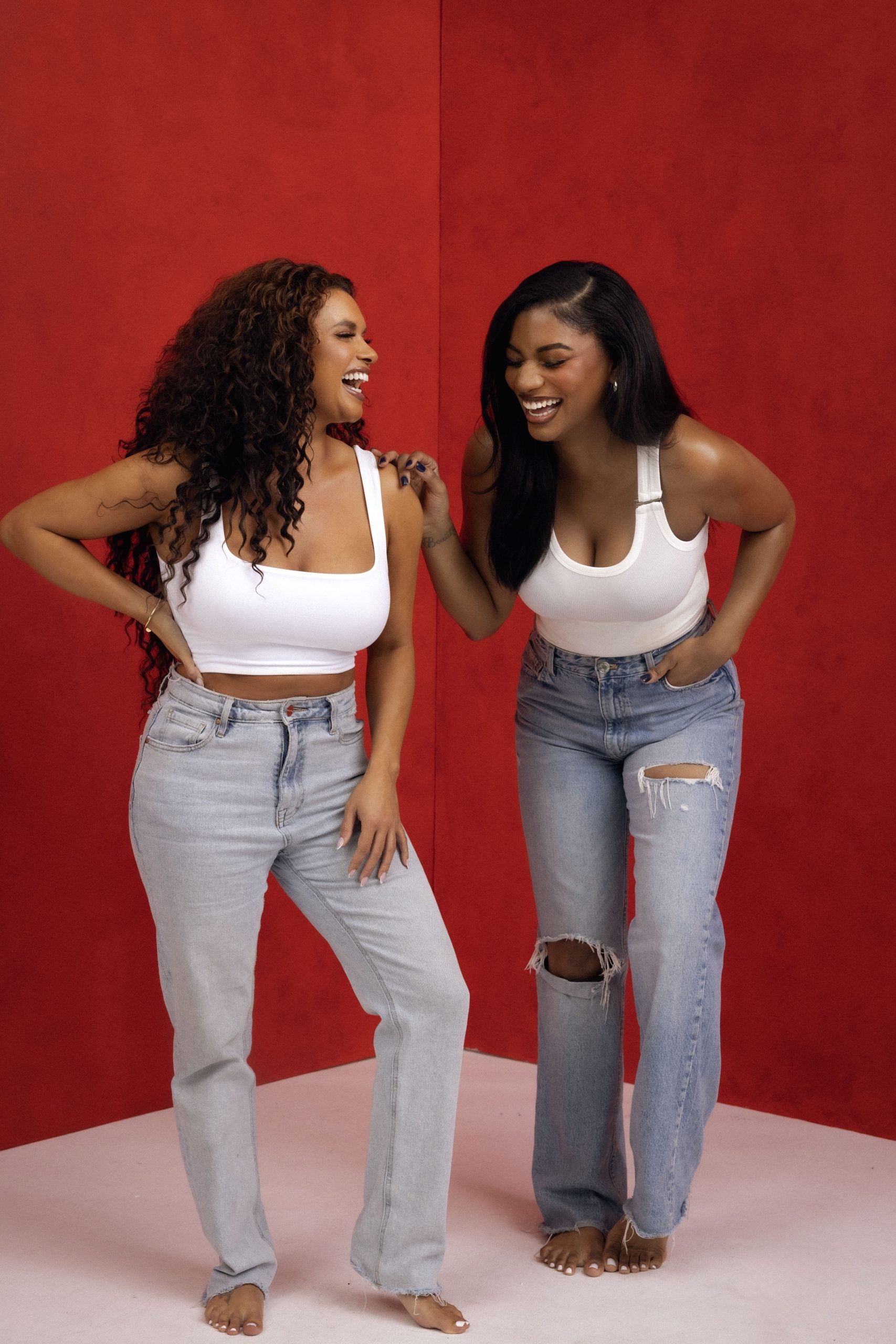


“There’s only been this tiny part that we have let people into,” Rooks explains. “So when you are just being yourself and talking about your lives, in the way that we are, there’s no way for it to be segmented, because this is truly just a conversation. So it is a kind of new horizon and new venture, and it’s not just different for us, it’s different for everyone that has ever consumed anything we’ve ever put out, which makes it really exciting.”
The structure of Two Personal is tailor made for the show’s talented co-hosts. While the method in which they tackle the latest news briefs, provocative subjects, and the most up-to-date stories in the sports world remains the same, the content itself will not. By delving into their innermost thoughts and emotions, this new podcast provides listeners with an in-depth look into the perspectives of Joy Taylor and Taylor Rooks like they’ve never seen before.
ESSENCE: Why did you two decide to share these intimate parts of yourselves and why do you think now is the perfect time to do so?
Joy Taylor: I think we were both at the point in our careers where we feel very accomplished and we feel that we’re known for what we set out to do, which is to establish ourselves in the sports space at a very high level, and we’re ready to step into a more personal space in the public eye. A big part of the reason that we are who we are in the sports realm of our career is because of who we are personally, because of our experiences, how we talk about sports, and how Taylor does her interviews. A lot of that comes from who we are personally, and we’ve never made ourselves the story. So this is an opportunity for us to talk about things that have nothing to do with sports, just our experiences, and the conversations that we have amongst each other as women, as friends. That was a big part of the reason why we wanted to step into that.
Taylor Rooks: I also think too, on top of us feeling very accomplished in this space, we feel very empowered, I think, to do something new, to show people who we really are at our core, to bear our friendship and ourselves. And I think that with what I do, I’m always asking people to tell me about themselves. And I’ve kind of sat down and been like, “I probably need to tell people about myself.” I think it’s important to have just a fully formed kind of persona. And I don’t think that I have felt fully formed and maybe I’ve also kind of succumbed to these ideas that I couldn’t be fully formed publicly. Even though to my friends, to the people that I love, I am a whole person, I don’t think that the work has always allowed me to show that I’m a whole person. So I’m really enjoying adding this element of it, because it’s me. It’s actually not even really “in addition,” it’s just, this part is me, and what people are used to seeing both of us doing. This show is about who we are. And I think that’s been really special, so far.
On the Two Personal Instagram page, there’s a clip where Joy says she wants people “to feel like they were watching a real conversation and not an argument in the comment section” with this show. Why did you feel the need to address that?
JT: Because I think that’s a big part of who Taylor and I are, who I am with my friends, who I am with my family. How we interact as human beings outside of the internet, is that we have real conversations. I’m sure you have friends that you get into heated, passionate conversations with, who you adamantly disagree with, but you remain friends with them. You continue your night after dinner and go and have new experiences with them. Your family, you may not agree on everything, but you still continue to have them in your life.
I think the comment section, while it has its perks and has its entertainment value, is not really how people speak to each other in real life. And it’s devolved into this space where if you disagree with someone on anything, however big or small, it is completely divisive, it’s the end, it’s you’re this, you’re that. We’re already so divided as a society on so many things for many different reasons, that when we have conversations, real conversations, they are complex, they have nuance, they have passion, they have reality, they have experiences, they have emotion, and you can’t get that in these small spaces that we have provided ourselves on the internet.
So we wanted to give ourselves a space, not only where we could have these conversations, where we show that we are two accomplished people with lots of experiences, who’ve come from different places, who are dear friends, but we also don’t agree on everything and we don’t see everything the same way, and we can still speak to each other in a way where we’re not screaming at each other or calling each other names or it turns into this whole drama that is just not really how people talk to each other. And I just want people to remember that’s not how we talk to each other. It’s just not real, and I think the internet is very discouraging in that way.
TR: The way people communicate in the comment section is one thing, but it’s also the content of what is in the comment section. A lot of the time, it isn’t based in reality. A lot of the time, like she said, there is no nuance to what people are saying. People just kind of want to get a point off. It doesn’t matter if it’s healthy, it doesn’t matter if it’s even fact, if it’s true. None of that feels like it matters sometimes when we are engaging in conversations online. And I think it’s important to always remind people that that’s not how people speak to one another.
And also, common thought is incredibly important. A lot of the time, the internet can dictate what common thought is, and how people online talk about men, how they talk about women, how they talk about relationships, friendships, money, whatever it is. it has become a little dangerous because it is influencing common thought. People are online and they think that the worst of people is what the world is. The same way sometimes they think the best of what they’re saying is what the world is. But we all know that the truth and the reality is somewhere in the middle, and in the conversations that we’re having, we really are exploring the middle, and we’re also exploring things that Joy has gone through, things that I have gone through, and how that has influenced how we interact both online, but also with just the overall discourse that is happening online. So, I like that the show is, to her point, going to have very real conversations, and not just real because we’re being honest, but real because this is how real people communicate with each other.
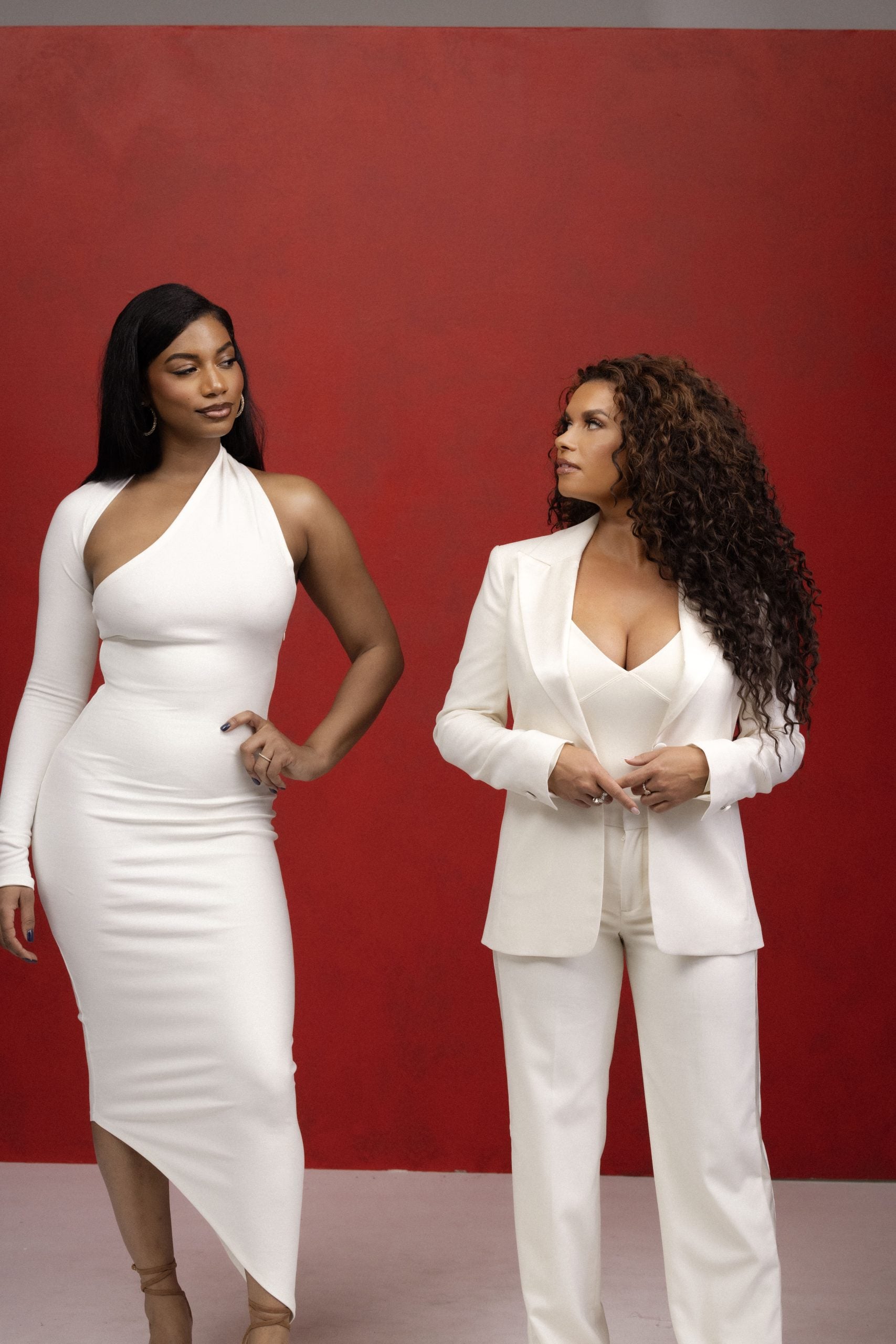


With your previous work, you two have been very meticulous. On the outside looking in, everything seems very structured. Can you walk me through the preparation process for this show, specifically?
JT: I think where we’ve gotten to with the show is it will feel like a phone call. So we know what it is we’re going to talk about, but I don’t know what she’s going to say. She doesn’t know what I’m going to say. So I will come prepared with what I want to say and she’s going to come prepared with what she wants to say, but we don’t know what’s coming, and that we want it to be a conversation.
And I want people to understand, that is the phone call. That is the dinner, that is the cocktails, that is the Uber ride. We have a lot going on in our lives. We have a lot that we have to balance. We have a lot that we’re experiencing or have experienced and are processing. I’m not getting into it with Taylor on the time that I have to speak to my dear friends, about some nonsense that does not apply to the problems that we have, the issues that we have. But I will say, “Did you see this?” Because that made me think of this time and this experience, and, “How did you feel when you experienced that? Because I know that you went through that.” And so that’s really what the conversation is. So I think it will be interesting to see how people respond to that, because again, the internet has made it seem like all anyone talks about is these over-the-top scenarios and things that really don’t apply to our everyday lives.
And we have real conversations about serious topics and emotional topics and business and family and relationships and siblings and childhood trauma. Those are the things I’m interested in talking to my friends about.
TR: People are used to seeing things that we do to be very produced, very segmented, and I mean it when I say this show is people seeing us in a way that they have not seen us. So whatever you’re thinking about in TV land, and in this content world, this is just us, pure us, together. And that’s what’s really exciting about it, because when you really think about whatever the perception is, of me or Joy, it is a very narrow perception, because we have only allowed people to know certain things about us.
Taylor, in one of the promotional videos, you spoke about the relationship with your mother, and I’m sure there will be other moments like this throughout the course of the show. In recording Two Personal, has it served as a sense of therapy for you?
TR: I would say it’s really nice to talk to somebody that I love and trust, about my experiences, and it’s also therapeutic in ways, for me to hear her talk about her life and experiences. Something I say often, because I really realized it as I’ve gotten older, is that being a woman is a singular experience for a lot of people. We go through a lot of the same things. Maybe different degrees of going through it, but we understand at its core, what womanhood is. And then for us, that is even doubled down by the fact that we are very similar in how we act and what we do and how we interact with others. So for me to just be able to sit down and be as honest as possible with her and feel like I can be my full self, has certainly been really nice. When I did that clip, I was really thinking, there are so few people in the world that I would have been able to sit there and cry and talk about my mom with.
So to know that I’ll be able to do this every week with you and talk about these things with, truly someone who holds a very unique spot in my life, is good. And it certainly is a little therapeutic.
JT: Yes, it’s been very therapeutic for me, just going through the process of even getting the show ready, because when you’re working on something that is going to expose you in some ways, things that haven’t been talked about publicly before, or spaces that we’ve intentionally held back from the public, for various reasons, it is a little scary. And I like to push myself and I like to grow and not get comfortable, particularly professionally, but the internet is a very scary place. It can be very daunting to put yourself out there, to have conversations about things that you’re passionate about. And sports has provided me a great outlet for something that I’m passionate about, to give my opinion, and then to express myself on these shows and have really fun conversations.
And we get into a little banter here and there that may be outside of sports, but that’s all just personality, right? We’re not having conversations about things that are outside of sports. So it’s been very fun and revealing to go through the journey of getting the show together and deciding how and what parts of ourselves we’re ready to talk about. And I think as we get more comfortable on the show, we’ll talk more, as well.
TR: And we’re already talking a lot.
JT: Everything is a journey, but it’s been really special and therapeutic for me to be in that space, too, because we’ve been on these paths for so long, to build up our careers in this particular space, it feels very new.
TR: And honestly, it feels, me doing this with you, makes me feel seen, in a lot of ways, because I feel like the public, the internet, whatever you want to call it, cares about what is going on in our lives, but maybe not always in the way we want them to care. So to know that we are now speaking to a group of people, a lot of them being women, that care about us in the ways that we care about each other, that functionally is also very therapeutic, too, to feel like you are being seen and accepted and heard in all the ways that you want to be seen, accepted, and heard, is really nice.
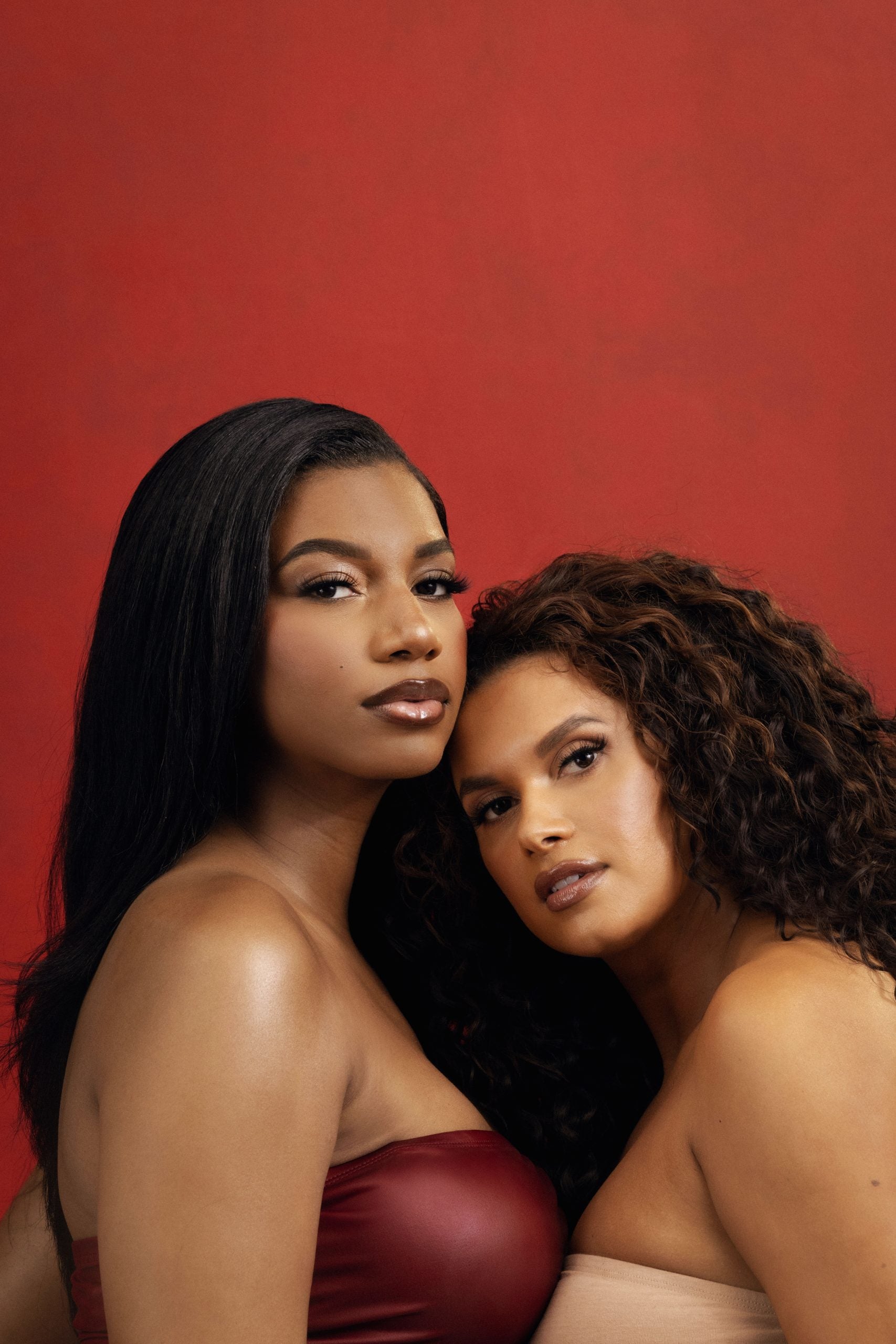


I feel that the release of this podcast has very important implications in the media space. How is it important to you both that black women’s voices are amplified in media? And in what ways can people outside of the media support that cause?
TR: It’s probably the most important thing to me. I feel like in this business, the number one responsibility that I have to anyone, is black women. And a lot of the time, black women aren’t seen, aren’t heard, are very silenced, they have labels put on them that are not true to who they are. And the black woman’s experience can be hard. There’s no other way to say it. It can be hard because there are so many people that want it to be hard. There’s so many people that want you to feel a way about being a black woman. And I think that it’s so important to always lead with the fact that we are strong, we are resourceful, we are emotional, we are all of these things that make us good at our jobs, but that also make us good people, it makes us good friends.
And we have to be able to show blackness in all forms, in all the ways. And the media does not always do that. There is not just one way to be a black woman. There are so many things that are not always spoken about, talked about, accepted, but black women are talking about them all the time. So we want to be able to have those conversations in a space that can resonate with people that look like us, and people that understand the experiences we’re discussing. And this is something that truly feels necessary to me, and to black women.
I was so overwhelmed by the response to that video that I posted about my emotions and my relationship with my mom, because there were so many people in the comments, saying that this feels like such a black woman struggle, that the world has forced us to not be able to stop and say, “How do I feel?” And I think that when people watch this show, they’ll almost always walk away from it feeling like this is also my black woman experience. And it’s important to talk about these things holistically like that.
JT: I think one of the biggest things that I find with being a black woman and having conversations with other black women is, whatever the conversation is, publicly, is so often not the conversation that we are having privately. It will be a story, there’s something going on, everyone is talking about this, everyone has an angle on it, and I will pick up the phone and call Taylor and be like, “Girl, I already know…” And it is running in the opposite direction of what everyone is saying is the purpose of the story, or the reason this happened. It’s how we should feel, it’s how we look, it’s how other black women look at this black woman. And none of it is true. And it feels like there’s this space where rational, reasonable thought is not available to black women.
Like Taylor said, there’s not one way to be a black woman, to show up as a black woman, to react as a black woman. And we often get put into these categories of, “okay, this is what black women want, this is how women dress, this is how black women talk, this is who black women want to date or expect on dates or will go on dates… everything is just so limited. And I don’t want to say wrong, because there is some space for that, but it’s just not the conversations I’m having. And that is frustrating, even speaking to men or women who are not black. I’m not having the same conversations with these different groups.
And to the second part of your question, I would kindly ask people to listen to what we are saying. One of the clips that we posted from our teaser episode was us talking about pretty privilege, which is something that we talk about often. Sometimes we talk about random things and sometimes we talk about pretty privilege and the patriarchy, at dinner. And I was really happy to see some of the responses, particularly from men, to that video, because I’m not going to lie, I was not sure what the response to that was going to be. At all. I thought it was going to be much more negative. And I was really happy to see a lot of the men in the comments, understanding what I was saying, and not being like, “Shut up, you’re pretty, your life is great.” It was really nice to see people listening to what we were talking about and what I was saying, and understanding that I wasn’t just complaining, I’m talking about my experience.
TR: Yeah. I thought it was a really good reaction. And what sticks out to me, too, which is, I think kind of a part of your question, is, it has been a little irritating to me and a little bothersome to me to see the stories that people tell about black women, a lot of the times are not even from black women. I think that the picture of black women has been painted by people that are not black women. So to be able to sit and tell our experiences, because we are speaking as something that we have been our entire lives, we know what it’s like, and we have lots of black women around us so we see a variety of perspectives and experiences and just anecdotal lessons that we hear all the time, and black women are the people that should control the narrative about other black women. And too often, especially on the internet, it’s other people trying to tell black women about black women.
So I liked to see that people listened to [Joy], because you were talking about a very specific, unique experience that can only come from you. And that’s what the show is. And wanting black women to listen to it and say, “I get that and feel that, because I know this person.” I am this person. And I hope that anyone that watches it, feels like we’re really kind of taking back the messaging and we are making sure that everybody sees, again, that it is a variety of black women. It’s not just one thing, but you should listen to all of those voices, and we’re just really thankful to have two of the voices that we’ll be able to put out there on Two Personal.

